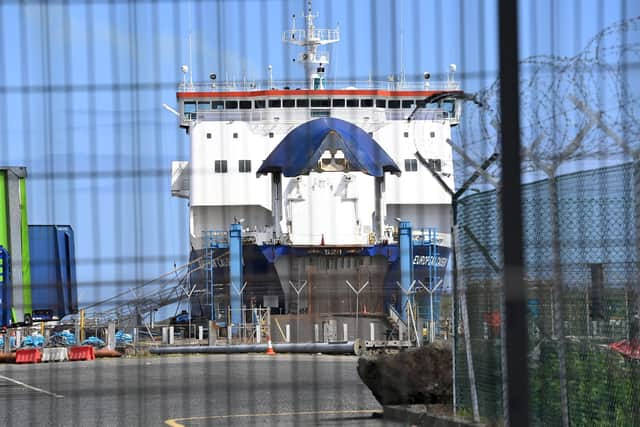Delays in decision-making adding to post-Brexit trading difficulties, committee reports
and live on Freeview channel 276
The report has been produced by politicians who sit on the British-Irish Parliamentary Assembly (BIPA) committee.
The committee has called for the UK and Irish governments and the EU to continue working together "to ensure that trade friction between the UK and Ireland is as low as it can possibly be in the new post-Brexit context”.
Advertisement
Hide AdAdvertisement
Hide AdIt also stresses the need for close cooperation to ensure that all new legal requirements entail the minimum possible burden on traders.


Committee chair Brendan Howlin TD said: “Since Brexit, the UK is no longer a member of the single market and the customs union. It therefore has the option to pursue international trade policies which it judges to be in its best interest.
“One of the effects of Brexit that has been felt most immediately has been the impact on trade. The UK's departure has altered the conditions in which trade occurs between the UK, Ireland, and mainland Europe.
"The conditions for trade between Great Britain and Northern Ireland have also changed as a result of the Northern Ireland Protocol.”
Advertisement
Hide AdAdvertisement
Hide AdThe committee reported that: “Traders who move goods from GB to the island of Ireland face higher costs because of the need to comply with EU rules. The UK government’s free Trader Support Service and Movement Assistance Scheme have mitigated the impact of this, but the long-term future of these services is uncertain."
In a statement accompanying the report, the committee said: "The report made a number of finding in relation to the post-Brexit trading environment, the Northern Ireland Protocol, the economic and social impacts of Brexit, business responses to the new trading environment, implementing new trading arrangements, delays in political decision-making, progress made since the end of the transition period in January 2021, the UK and Irish Governments’ implementation of the new trading arrangements.”
It lists the key points of the report as:
The UK Government should clarify its policy on charging for use of inland inspection facilities for goods arriving from Ireland. It should ensure that its policy does not create market distortions that favour or penalise the use of some trade routes over others and increase costs for hauliers, their clients and consumers.
Traders who move goods from GB to the island of Ireland face higher costs because of the need to comply with EU rules. The UK Government’s free Trader Support Service and Movement Assistance Scheme have mitigated the impact of this, but the long-term future of these services is uncertain.
Advertisement
Hide AdAdvertisement
Hide AdThe UK Government should clarify the future of the Trader Support Service and Movement Assistance Scheme. It should consider what long-term support it will make available to support traders with the costs and administrative burdens of moving goods across the Irish Sea. Consideration should be given to making the Trader Support Service and the Movement Assistance Scheme permanent.
Further changes to the post-Brexit trading environment are likely to occur in the future, and the experience of GB traders shows how change can create challenges for businesses.
While we recognise there is support already in place through Enterprise Ireland and other state agencies, the Irish Government should consider how it will support traders to meet any new requirements on trade with Great Britain once full controls are imposed. The experiences of GB-based traders, HMRC and the Trader Support Service could be instructive.
Stakeholders told us they needed certainty about the trading environment to be able to plan for the future. We heard that uncertainty about the UK’s plans for introducing full import controls on goods entering Great Britain from Ireland was unhelpful.
Advertisement
Hide AdAdvertisement
Hide AdThe UK Government should prioritise the needs of traders when setting and communicating its plans for implementing post-Brexit trading arrangements. Specifically, it should not set a further date for the introduction of controls on goods entering Great Britain from Ireland until it is sure that target will be met. Traders should be given a lead-in time of at least six months to be able to prepare for the new arrangements.
The current definition of ‘goods not at risk’ is fairly narrow, reflecting the EU’s understandable caution about protecting the Single Market. However, over time it may be possible to broaden this definition and so reduce trade frictions and costs to businesses and consumers.
- The UK and the EU should cooperate and share data to develop a sophisticated understanding of the real risks posed to the Single Market by goods entering from the UK.
- The EU and the UK should seek to reach an SPS agreement to reduce the administrative and cost burden of animal health checks for products crossing the Irish Sea. The UK and the EU need to resume negotiations in order to achieve that negotiated settlement.